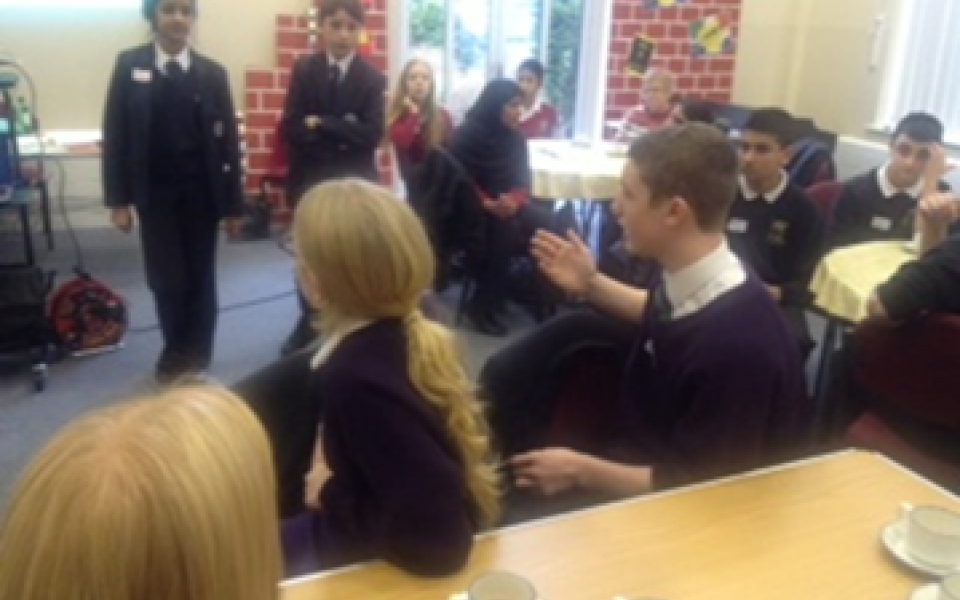
For the month of December, the Tony Blair Faith Foundation (TBFF) will feature URI's "Talking Back to Hate" campaign as part of their "Face to Faith" project. As December 10th is UN International Day of Human Rights, the Foundation chose to highlight URI's great interfaith dialogue program by providing resources for teachers.
Teachers and students are asked to hold discussions about human rights with a special focus on hate speech and freedom of speech. These lessons encourage teachers to define the term "human rights" to students, reflect on their importance, and explore what different faith traditions teach about rights and compassion for others, distinguishing between freedom of expression and hate speech.
There are four areas of focus that students are encouraged to act upon in order to prepare themselves for encounters with those of differering faiths: a series of video conferences running through Dec. 9-12, a Twitter campaign, a blog series, and community engagement.
The teaching materials echo the sentiments of URI's "Talking Back to Hate" campaign page:
"Hate speech, discrimination and bullying are global problems that can affect any of us.
As people of many cultures, faiths and backgrounds, we're committing today to take specific steps to address hate and discrimination in our communities, and to work for a world where every person, regardless of their ethnicity, race, religion, culture, gender, orientation or ability, is treated with respect and is safe to be themselves. We call upon our political and community leaders to make new efforts to secure and defend these fundamental human rights for all people, and to speak out together against acts of hate, discrimination and bullying."
In addition, Face to Faith also offers a number of suggestions as to how teachers and students can act with their community:
Keep it simple/ keep it small
1. Students assist teachers and school leaders in reviewing their anti-bullying policy to ensure that it includes references to and strategies for dealing with hate speech.
2. Plan and deliver a class or assembly to educate younger children about the ‘Talk Back to Hate’ campaign and how they can stand up to hate speech.
3. Hold a meeting with local community members like religious leaders, community leaders, parents etc to have a panel discussion about hate speech in the community.
4. Hold letter writing/ email drive at school asking people in your school/ community to communicate with those who spread misinformation about or disrespect religious groups.
5. Have a ‘Talk Back to hate’ tree in your school/ community centre. Hang Talk Back to Hate pledges onto the tree (if not a real tree then the leaves can be the pledges). This could be a Christmas tree that is decorated with a difference!
6. Have a Solidaritea (or any other drink that is popular in your region) that brings your community together informally to share their commitments to standing up to hate speech.
7. Hold a ‘Don’t Talk Back to Hate’ event where students take a vow of silence to remember those who have been silenced by a hate crime.
8. Celebrate your ‘Talk Back to Hate’ heroes. Research local and global upstanders and celebrate them by creating posters about them, holding an assembly about them.
9. Put up posters around your school that ‘Talk Back to Hate’.
10. Set up a group in school that supports victims of hate speech.
Make it big/ make it bold
11. Hold a ‘Talk Back to Hate’ art exhibition showcasing your art, posters, sculptures, etc that speaks back to hate.
12. Graffiti a wall (with permission) with messages of love, coexistence and peace.
13. Hold a ‘Talk Back to Hate’ concert inviting diverse groups from the community, celebrating the diversity of the community.
14. Go viral! Create ‘Talk Back to Hate’ videos and post them on social media sites. Let’s see how many it reaches!
15. Celebrate your ‘Talk Back to Hate’ heroes by having a parade where students represent these inspirational people.
16. ‘Walk ‘n’ Talk Back to Hate’ by having a parade through your local community holding banners that show a commitment to standing up to hate speech.
17. Flash mob
18. Plan and deliver with the help of local religious leaders an ecumenical service that speaks back to hate and spreads messages of coexistence and harmony.
Please let the Tony Blair Faith Foundation know what you do to "Talk back to hate" by emailing:
F2Fadmin@
